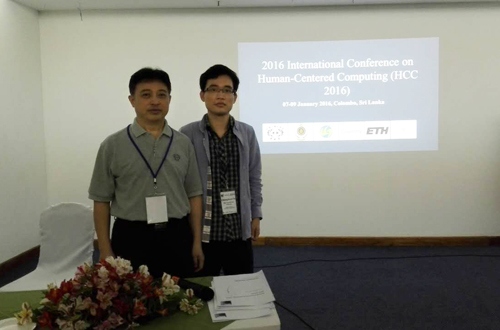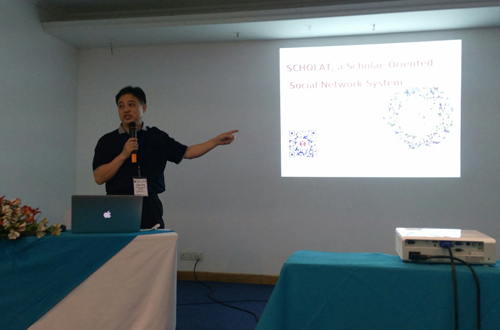國際學(xué)術(shù)會(huì)議(The International Conference on Human Centered Computing, HCC2016,原ICPCA)于2016年1月7日至9日在斯里蘭卡首都科倫坡召開。
湯庸教授擔(dān)任此次會(huì)議總主席,,并作題為“Scholar centered Computing: research and applications”的特約報(bào)告,。
傅城州應(yīng)邀擔(dān)任分會(huì)主席,并作題為“Survey on android applications security”學(xué)術(shù)報(bào)告,,本報(bào)告的研究論文被大會(huì)錄用,,并擬在Springer出版社的LNCS叢書出版。
大會(huì)期間,,與大會(huì)合辦方斯里蘭卡莫拉圖瓦大學(xué)Gihan Dias教授進(jìn)行了學(xué)術(shù)交流,。

湯庸教授與博士生傅城州會(huì)場(chǎng)合影

湯庸教授作報(bào)告

傅城州主持分會(huì)
背景材料:
Human-Centered Computing (HCC) is a rapidly evolving interdisciplinary field of human-computer interaction (HCI), computer supported cooperative work (CSCW), social computing, collaborative computing, ubiquitous computing, services computing, etc., which focuses on the innovative theory, principles, technology, design, implementation and deployment of computing systems, cognitive and social systems, and physical facilities and environments that supporting human’s activities.
With the advance in networking and communication technologies, we, as the ordinary people (either technology savvy or technology averse) become increasingly a “digital pixel” in the picture of the hyper-connected world. Hyper-connectivity envisions a change of mentality at both technical and societal levels. At the technical level, it extends the current communication network to encompass pervasive human-to-machine and machine-to-machine communication through sensors and effectors.
At the societal level, it tries to digitise and quantify our online and off-line behaviours, so as to offer better services and user experiences. This vision not only extends the current “norm” of how humans interact with the digital world, but also profoundly sharps how we interact with other human beings. Research challenges presented by hyper-connectivity cover a wide spectrum of topics, including computer, mobile, and sensor network, human-computer interaction, security and privacy, etc. just to name but a few.
The multidisciplinary nature of the domain of discourse dictates the breadth of issues that need to be investigated. Without enumerating superficially all the relevant research topics, the Human-Center Computer (HCC) conference would like to inspire discussions and foster collaboration in a wide spectrum of key enabling technologies. At the most fundamental level, the vision of HCC cannot be realised without enabling infrastructure. HCC would like to focus on wireless networks and mobile communication, sensor network, and Internet of (every)thing. Residing on the infrastructure are services that not only support human-to-human interaction but also facilitate the interplay between humans and machines as well as machines and machines with improved accessibility and mobility, through cloud computing, mobile computing, virtualisation at different abstraction levels, and multi-module sensor integration. A large amount of data is thereof produced through such interactions, broaching the “data” utilisation challenge that fuels the innovation of modern human societies.
In particular, HCC would like to further our understanding on Open data, Linked data, and Big Data storage, visualisation, and analytics. Eventually, all these contribute an intelligent society that centred the real needs of individual human beings. Research topics such as personalisation, context-aware computing, social computing, and service computing can help to develop and deploy physical facilities and environments that supporting our everyday life, from work to entertainment.